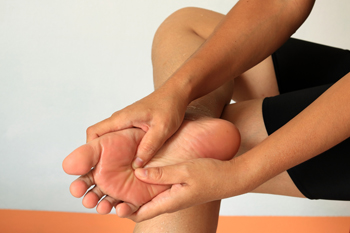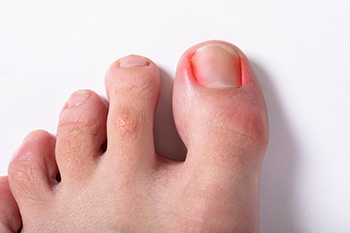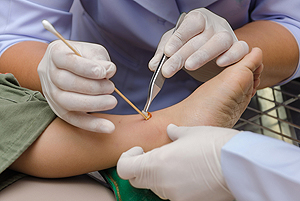
 The most common form of peripheral neuropathy affects the feet. When there is a problem affecting the nerves in the feet, one can experience tingling and numbness in the feet, shooting, stabbing, or burning pain there, loss of coordination and balance, and muscle weakness. There is typically an underlying condition for those with this disorder. Those with diabetes and the elderly are most apt to be affected by this condition. Loss of sensation and possible injury to the feet without knowing it is a dangerous combination. It is vital that one who suffers from this type of neuropathy takes proper and daily care of one’s feet. Such care includes keeping feet clean, looking for ingrown toenails, sores or signs of injury, moisturizing feet, and wearing proper fitting shoes. While symptoms can be intermittent, because of the danger involved and the progressive nature of the condition, it is suggested that one consult a podiatrist as early as possible for relief of symptoms and treatment recommendations.
The most common form of peripheral neuropathy affects the feet. When there is a problem affecting the nerves in the feet, one can experience tingling and numbness in the feet, shooting, stabbing, or burning pain there, loss of coordination and balance, and muscle weakness. There is typically an underlying condition for those with this disorder. Those with diabetes and the elderly are most apt to be affected by this condition. Loss of sensation and possible injury to the feet without knowing it is a dangerous combination. It is vital that one who suffers from this type of neuropathy takes proper and daily care of one’s feet. Such care includes keeping feet clean, looking for ingrown toenails, sores or signs of injury, moisturizing feet, and wearing proper fitting shoes. While symptoms can be intermittent, because of the danger involved and the progressive nature of the condition, it is suggested that one consult a podiatrist as early as possible for relief of symptoms and treatment recommendations.
Neuropathy
Neuropathy can be a potentially serious condition, especially if it is left undiagnosed. If you have any concerns that you may be experiencing nerve loss in your feet, consult with Dr. Todd Goldberg from Complete Family Foot Care Center. Our doctor will assess your condition and provide you with quality foot and ankle treatment for neuropathy.
What Is Neuropathy?
Neuropathy is a condition that leads to damage to the nerves in the body. Peripheral neuropathy, or neuropathy that affects your peripheral nervous system, usually occurs in the feet. Neuropathy can be triggered by a number of different causes. Such causes include diabetes, infections, cancers, disorders, and toxic substances.
Symptoms of Neuropathy Include:
Those with diabetes are at serious risk due to being unable to feel an ulcer on their feet. Diabetics usually also suffer from poor blood circulation. This can lead to the wound not healing, infections occurring, and the limb may have to be amputated.
Treatment
To treat neuropathy in the foot, podiatrists will first diagnose the cause of the neuropathy. Figuring out the underlying cause of the neuropathy will allow the podiatrist to prescribe the best treatment, whether it be caused by diabetes, toxic substance exposure, infection, etc. If the nerve has not died, then it’s possible that sensation may be able to return to the foot.
Pain medication may be issued for pain. Electrical nerve stimulation can be used to stimulate nerves. If the neuropathy is caused from pressure on the nerves, then surgery may be necessary.
If you have any questions, please feel free to contact our office located in Littlestown, PA . We offer the newest diagnostic and treatment technologies for all your foot care needs.
There are several reasons why your child may be having heel pain or tenderness at the back of their foot. Sever’s disease is a condition in which a child’s Achilles tendon pulls on and aggravates the growth plate at the back of the heel bone. In Achilles tendonitis, a sudden increase in activity can damage the Achilles tendon, causing pain, warmth, inflammation, and difficulty in walking. Plantar fasciitis is a very common form of heel pain. This condition is an inflammation of the plantar fascia tissue on the sole of the foot, which connects the heel to the toes. If your child has fallen or had an acute injury to the heel, they may have fractured the heel bone. No matter what the cause of your child’s heel pain is, a podiatrist can diagnose it and devise an appropriate treatment plan. If your child is limping or walking on their toes, or complains about pain in their heel or tenderness at the back of their feet, make an appointment for them with a podiatrist.
Making sure that your children maintain good foot health is very important as they grow. If you have any questions, contact Dr. Todd Goldberg of Complete Family Foot Care Center. Our doctor can provide the care you need to keep you pain-free and on your feet.
Keeping Children's Feet Healthy
Having healthy feet during childhood can help prevent medical problems later in life, namely in the back and legs. As children grow, their feet require different types of care. Here are some things to consider...
Although babies do not walk yet, it is still very important to take care of their feet.
Avoid putting tight shoes or socks on his or her feet.
Allow the baby to stretch and kick his or her feet to feel comfortable.
As a toddler, kids are now on the move and begin to develop differently. At this age, toddlers are getting a feel for walking, so don’t be alarmed if your toddler is unsteady or ‘walks funny’.
As your child gets older, it is important to teach them how to take care of their feet.
Show them proper hygiene to prevent infections such as fungus.
Be watchful for any pain or injury.
Have all injuries checked by a doctor as soon as possible.
Comfortable, protective shoes should always be worn, especially at play.
If you have any questions please feel free to contact our office located in Littlestown, PA . We offer the newest diagnostic and treatment technologies for all your foot and ankle needs.
 You probably have an ingrown toenail (onychocryptosis) if the edge of your toenail grows into the skin of your toe. The area around the nail will likely be red and painful because it is irritated. If it progresses to infection, the skin might bulge around the nail and pus, or a clear fluid can be present. It stands to reason that the longer this condition is left untreated, the more likely it is to become infected. Ingrown toenails may be caused by wearing shoes that crowd the toenails, improper cutting of toenails, injury to the toenail, or toenails that are unusually curved. If you suspect you have an ingrown toenail or any other foot discomfort, you should visit a podiatrist for proper diagnosis and treatment.
You probably have an ingrown toenail (onychocryptosis) if the edge of your toenail grows into the skin of your toe. The area around the nail will likely be red and painful because it is irritated. If it progresses to infection, the skin might bulge around the nail and pus, or a clear fluid can be present. It stands to reason that the longer this condition is left untreated, the more likely it is to become infected. Ingrown toenails may be caused by wearing shoes that crowd the toenails, improper cutting of toenails, injury to the toenail, or toenails that are unusually curved. If you suspect you have an ingrown toenail or any other foot discomfort, you should visit a podiatrist for proper diagnosis and treatment.
Ingrown toenails can become painful if they are not treated properly. For more information about ingrown toenails, contact Dr. Todd Goldberg of Complete Family Foot Care Center. Our doctor can provide the care you need to keep you pain-free and on your feet.
Ingrown Toenails
Ingrown toenails occur when a toenail grows sideways into the bed of the nail, causing pain, swelling, and possibly infection.
Causes
Prevention
Because ingrown toenails are not something found outside of shoe-wearing cultures, going barefoot as often as possible will decrease the likeliness of developing ingrown toenails. Wearing proper fitting shoes and using proper cutting techniques will also help decrease your risk of developing ingrown toenails.
Treatment
Ingrown toenails are a very treatable foot condition. In minor cases, soaking the affected area in salt or antibacterial soaps will not only help with the ingrown nail itself, but also help prevent any infections from occurring. In more severe cases, surgery is an option. In either case, speaking to your podiatrist about this condition will help you get a better understanding of specific treatment options that are right for you.
If you have any questions please feel free to contact our office located in Littlestown, PA . We offer the newest diagnostic and treatment technologies for all your foot and ankle needs.
 A diabetic foot ulcer (DFU) is a type of wound that can develop on the lower limbs of people with diabetes. These wounds typically heal slowly and poorly and are at an increased risk of becoming infected. Sometimes debridement is necessary to treat a DFU. Debridement is the process of removing dead or damaged skin, tissue, and debris from a wound to help it heal. During debridement, the podiatrist will clean and disinfect the wound, then probe it with a metal instrument to check how deep the wound is and if there are any foreign objects in it. The podiatrist will then cut away dead tissues and wash out the DFU. This is generally done under local or general anesthesia. Not all debridement involves cutting away dead tissues. Depending on the needs of the patient, it may also be possible to debride the wound with special enzymes, dressings, and more. If you have DFUs, it is suggested that you are under the care of a podiatrist.
A diabetic foot ulcer (DFU) is a type of wound that can develop on the lower limbs of people with diabetes. These wounds typically heal slowly and poorly and are at an increased risk of becoming infected. Sometimes debridement is necessary to treat a DFU. Debridement is the process of removing dead or damaged skin, tissue, and debris from a wound to help it heal. During debridement, the podiatrist will clean and disinfect the wound, then probe it with a metal instrument to check how deep the wound is and if there are any foreign objects in it. The podiatrist will then cut away dead tissues and wash out the DFU. This is generally done under local or general anesthesia. Not all debridement involves cutting away dead tissues. Depending on the needs of the patient, it may also be possible to debride the wound with special enzymes, dressings, and more. If you have DFUs, it is suggested that you are under the care of a podiatrist.
Wound care is an important part in dealing with diabetes. If you have diabetes and a foot wound or would like more information about wound care for diabetics, consult with Dr. Todd Goldberg from Complete Family Foot Care Center. Our doctor will assess your condition and provide you with quality foot and ankle treatment.
What Is Wound Care?
Wound care is the practice of taking proper care of a wound. This can range from the smallest to the largest of wounds. While everyone can benefit from proper wound care, it is much more important for diabetics. Diabetics often suffer from poor blood circulation which causes wounds to heal much slower than they would in a non-diabetic.
What Is the Importance of Wound Care?
While it may not seem apparent with small ulcers on the foot, for diabetics, any size ulcer can become infected. Diabetics often also suffer from neuropathy, or nerve loss. This means they might not even feel when they have an ulcer on their foot. If the wound becomes severely infected, amputation may be necessary. Therefore, it is of the upmost importance to properly care for any and all foot wounds.
How to Care for Wounds
The best way to care for foot wounds is to prevent them. For diabetics, this means daily inspections of the feet for any signs of abnormalities or ulcers. It is also recommended to see a podiatrist several times a year for a foot inspection. If you do have an ulcer, run the wound under water to clear dirt from the wound; then apply antibiotic ointment to the wound and cover with a bandage. Bandages should be changed daily and keeping pressure off the wound is smart. It is advised to see a podiatrist, who can keep an eye on it.
If you have any questions, please feel free to contact our office located in Littlestown, PA . We offer the newest diagnostic and treatment technologies for all your foot care needs.
Warts on the sole of your foot or toes, known as plantar warts or verrucas, are caused by a viral infection of the skin. The virus enters your body through a cut, scrape, or other small opening in the skin and produces one or more grainy, flesh-colored warts with small black dots in the center. Most warts are painless, though some may be uncomfortable if they are located on a weight-bearing area, like the heel or ball of the foot. Fortunately, most plantar warts go away on their own, but this can take quite some time, ranging from months to years. To speed up recovery, you may wish to seek treatment from a podiatrist. It is also a good idea to consult with a podiatrist if you have a medical condition like diabetes or immune insufficiency, which can make plantar warts a more serious concern.
Plantar warts can be very uncomfortable. If you need your feet checked, contact Dr. Todd Goldberg from Complete Family Foot Care Center. Our doctor will assist you with all of your foot and ankle needs.
About Plantar Warts
Plantar warts are the result of HPV, or human papillomavirus, getting into open wounds on the feet. They are mostly found on the heels or balls of the feet.
While plantar warts are generally harmless, those experiencing excessive pain or those suffering from diabetes or a compromised immune system require immediate medical care. Plantar warts are easily diagnosed, usually through scraping off a bit of rough skin or by getting a biopsy.
Symptoms
Treatment
To help prevent developing plantar warts, avoid walking barefoot over abrasive surfaces that can cause cuts or wounds for HPV to get into. Avoiding direct contact with other warts, as well as not picking or rubbing existing warts, can help prevent the further spread of plantar warts. However, if you think you have developed plantar warts, speak to your podiatrist. He or she can diagnose the warts on your feet and recommend the appropriate treatment options.
If you have any questions please feel free to contact our office located in Littlestown, PA . We offer the newest diagnostic and treatment technologies for all your foot and ankle needs.